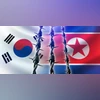South Korea and the European Union on Monday strongly condemned North Korea's reported dispatch of troops to aid Russia's war against Ukraine and expressed concerns that Russia could reward North Korea with transfers of sensitive technology to enhance its nuclear and missile programs.
North Korea's troop deployment, confirmed by the US and NATO, threatens to expand the almost 3-year-long war and is causing security jitters in South Korea and elsewhere about what Russia could give North Korea in return.
After a meeting in Seoul, South Korean Foreign Minister Cho Tae-yul and EU foreign policy chief Josep Borrell issued a joint statement condemning in the strongest possible terms North Korea's deployment and voicing worries about Russia's possible provision of materials and technology to North Korea in support of its military objectives.
We are also deeply concerned about the possibility for any transfer of nuclear- or ballistic missile-related technology to the DPRK, which would jeopardise the international non-proliferation efforts and threaten peace and stability on the Korean Peninsula and across the globe, the statement said. DPRK stands for the Democratic People's Republic of Korea, North Korea's official name.
Cho and Borrell called North Korea's deployment a flagrant violation of multiple UN Security Council resolutions and called on North Korea and Russia to immediately withdraw the troops from Russia.
Also on Monday, in Moscow, Russian President Vladimir Putin met North Korean Foreign Minister Choe Son Hui, who has been on an official visit to Russia since late last week. State television showed them greeting each other, but details of the meeting were not available.
Earlier Monday, Borrell met South Korean Defence Minister Kim Yong Hyun and they agreed to work together with the international community to try to obstruct Russian-North Korean security cooperation, according to the South Korean Defence Ministry.
More From This Section
North Korea and Russia haven't explicitly confirmed the North Korean deployment. But they've both argued that their military cooperation conforms with international laws.
US State Department spokesman Matthew Miller told reporters Monday that as many as 10,000 North Korean soldiers were in Russia's Kursk region near Ukraine's border and preparing to join Moscow's fight against Ukraine in the coming days. That's up from the 8,000 troops that the US government mentioned Thursday.
Ukraine's President Volodymyr Zelenskyy urged allies to stop just watching and take steps before North Korean troops deployed in Russia reach the battlefield.
According to US, South Korean and Ukrainian intelligence assessments, North Korea was estimated to have moved a total of about 10,000 to 12,000 troops to Russia. If they start fighting against Ukraine forces, it would mark North Korea's first participation in a large-scale conflict since the end of the 1950-53 Korean War.
North Korean leader Kim Jong Un has used the Russia-Ukraine war as a way to expand defense and economic cooperation with Russia in the face of an intensifying US-led pressure campaign against his advancing nuclear program. The US, South Korea and others accuse North Korea of having already exported artillery shells, missiles and other conventional arms to Russia.
Besides Russia's possible weapons technology transfer, South Korean officials also worry that Moscow might offer defense commitment to North Korea in the event of a war on the Korean Peninsula. The North Korean troops in Russia could also learn valuable combat experience and get Russian help to modernise their outdated conventional weapons systems.
In the past two years, Kim has ramped up tests of nuclear-capable missile systems, as Russia and China have repeatedly blocked US-led attempts to toughen international sanctions on North Korea over its testing activities in defiance of UN bans. Last week, North Korea test-launched an intercontinental ballistic missile designed to attack the US mainland for the first time in almost a year.
North Korea has also pushed to sever relations and abandon its long-standing goal of reconciliation with South Korea.
In a background briefing with local media Monday, South Korea's military said North Korea has built anti-tank, trench-like structures at two sites near the Koreas' heavily armed border, where it blew up northern parts of unused cross-border road and rail routes last month in a display of anger toward South Korea.
In a war situation, the North could easily fill up the trenches with piles of dirt nearby to create routes to invade the South, according to the Joint Chiefs of Staff.
Details of the briefing were shared with The Associated Press.
)